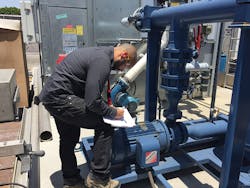Sustainability Efforts in Manufacturing Bolstered by NAM, DOE Partnership
As manufacturers continue their journey to become more sustainable further help is now available.
On April 10 the U.S. Department of Energy (DOE) and the National Association of Manufacturers (NAM) announced the Sustainability in Manufacturing partnership. Through this partnership fostered by DOE’s Better Plants program, the partners will help U.S. manufacturers drive energy productivity improvements and accelerate adoption of energy-efficient technologies.
“Working alongside our private sector partners, we are driving cost savings and a stronger, more secure U.S. industrial base,” said Secretary of Energy Rick Perry.
Through the Better Plants program, nearly 200 leading manufacturers are able to set specific energy efficiency goals and share innovative energy reduction strategies. Partners in this program voluntarily set a specific goal, typically to reduce energy intensity by 25% over a 10-year period across all their U.S. operations.
Last year the program saved about $4.2 billion in cumulative energy costs across nearly 3,000 facilities that represent about 12% of the U.S. manufacturing energy footprint.
Some highlights from last year progress report include:
--DOE welcomed Bristol-Myers Squibb and eleven other partners, bringing the total number of partners committing to improve energy performance to 190.
--General Motors, a Challenge partner in the Fortune 10, exceeded its water goal four years early and reduced its water intensity by 28.3% against a 2010 baseline.
--Honda North America joined the Better Plants Supply Chain Initiative, sponsoring a cohort of eight suppliers that are now taking advantage of program resources and support to improve their energy efficiency.
-- New Better Practice and Better Project awards were introduced in 2017 to honor 11 partners’ exceptional energy-efficiency solutions, including Harley-Davidson, Eastman, and C.F. Martin Guitar.
-- The Field Validation and Diagnostic Equipment Program was created to facilitate data analysis and measurement among partners.
“Manufacturers accept the responsibility to better the future of our communities, our environment and our children, which is why over the past decade, we have reduced emissions by 10% even as our value to the economy has increased 19%,” said NAM CEO Jay Timmons.
About the Author
IW Staff
Find contact information for the IndustryWeek staff: Contact IndustryWeek
